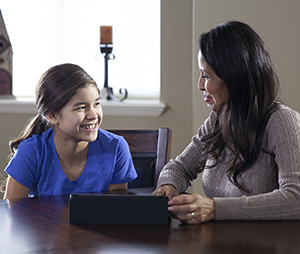|
|
|
|
For Girls: Understanding Puberty
If you are between ages 8 and 14, you're probably starting puberty. This stage of your life is when you change from a girl into a young woman. Puberty will last a few years. During puberty, your body will go through changes. And your feelings may take you on a roller coaster ride.

We understand gender is a spectrum. We may use gendered terms to talk about anatomy and health risk. Please use this sheet in a way that works best for you and your provider as you talk about your care.
Body changes ahead
Your body gives you clues that you are turning into a young adult. You’ll notice:
-
A changing shape. New curves may appear as you get fuller hips and bigger breasts. Talk with your mother or another adult you trust about helping you find a comfortable undershirt, sports bra, or regular bra to help you feel more comfortable as your breasts develop. One breast may be larger than the other as they start growing. This is normal, and they should even out over a year or so. It's also helpful to know that it's common for many women's breasts to not be exactly the same size. If that's the case, you'll likely be the only one who notices.
-
Hair in new places. Hair grows under your arms and on your legs. You will also grow hair in your pubic area. This hair may be coarser and curlier than other body hair.
-
More sweat. You may start to sweat more. Wash well each day. To help you stay dry and prevent odor, use an antiperspirant or deodorant in your armpits.
-
Skin issues. Your skin may become more oily. The oil and dead skin can clog pores and cause acne. To help control acne, keep your skin clean. Using special skin care products to wash or apply to pimples can also help. Some people need prescription medicine to help control acne. These may be put on the skin or taken by mouth. Talk with a parent about seeing your healthcare provider for acne that's hard to treat at home.
-
Your first menstrual period. During puberty, you will start your period or menstrual cycle. Your period is the small amount of bleeding that occurs when your body gets rid of the lining of your uterus. It usually happens once a month, between 21 and 34 days. But each girl's cycle is different. The bleeding often lasts from 2 to 7 days. When you first get your period it may be irregular, skipping a month or more. You will need to use feminine hygiene products to keep blood from leaking on your clothes. These include tampons, pads, or menstruation cups. Getting your period is a normal and healthy process to becoming a woman. It can be exciting. But it can also be a scary time. Talk with any trusted adult in your life for help and advice, including a parent or healthcare provider.
A roller coaster ride of feelings
Becoming a young woman isn't always easy. Many girls have emotional concerns, such as:
-
Worrying about your body. Body image is how we think and feel about the way we look. Body image can be positive, which means you feel comfortable just as you are. Or you may feel uncomfortable about your body. Body image can be affected by messages from lots of places, such as family, friends, social media, TV, and movies. Talk with a trusted person if you’re struggling with your body image and want to feel better.
-
Feeling sad. Moods go up and down a lot as you’re going through hormone changes. At times you may feel sad or lonely. But if you feel sad most of the time, it may be depression. This is a common problem that can be treated with counseling, medicine, and other methods. If it’s not treated, it may get worse. Talk with a trusted adult at school or home if you think you may be depressed.
-
Getting mad! People may annoy you. You may argue with your parents or friends. If you start to feel angry, take a time-out to calm down. Try a few deep breaths. Ask yourself what you're feeling and why. Think about how to respond to a person or situation that will address your concerns with less anger. Or step away from the situation until you're feeling calmer. Then try again.
Asking for help
Puberty can be a tough time. But there are people who can help you through the tough parts. You may like talking with a parent, healthcare provider, teacher, or other trusted adult. You may find comfort in talking with your friends. When in doubt, always ask someone for help.
© 2000-2024 The StayWell Company, LLC. All rights reserved. This information is not intended as a substitute for professional medical care. Always follow your healthcare professional's instructions.
|
|
|
© Copyright StayWell. All Rights Reserved.